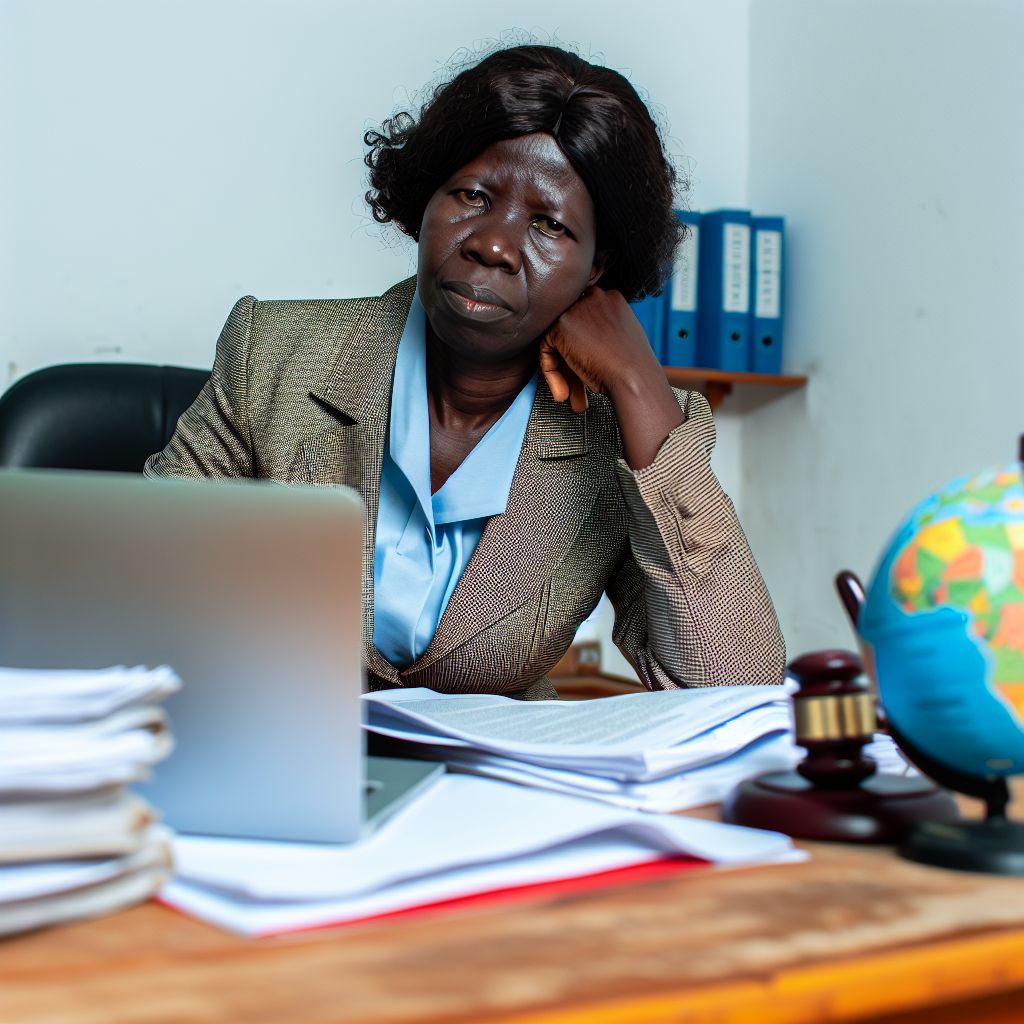Introduction
In Nigeria, NGOs (Non-Governmental Organizations) are non-profit organizations that operate independently of the government.
These organizations play a crucial role in advocating for human rights, social justice, and sustainable development at both the national and international levels.
International law, on the other hand, refers to the set of rules and principles that govern the relationships between states and other international actors.
It covers a wide range of issues, including human rights, environmental protection, and conflict resolution.
Nigerian NGOs serve as important actors in promoting and upholding international law.
They often work collaboratively with international organizations, governments, and other NGOs to advocate for the implementation of international treaties and conventions.
Nigerian NGOs Promoting Human Rights
Examples of Nigerian NGOs working to protect human rights globally.
- Amnesty International Nigeria: This organization advocates for human rights worldwide through research and campaigns.
- Civil Liberties Organization (CLO): CLO focuses on promoting civil liberties and protecting human rights in Nigeria.
- Women’s Rights Advancement and Protection Alternative (WRAPA): WRAPA works to advance and protect women’s rights both locally and internationally.
Impact of their work on international law.
Nigerian NGOs play a crucial role in shaping international law and policies related to human rights.
By advocating for the protection of human rights at both the national and international levels, these organizations contribute to the development of international treaties and conventions aimed at upholding human rights globally.
The work of Nigerian NGOs in promoting human rights has helped raise awareness about human rights violations.
They have influenced decision-makers to prioritize human rights in their policy-making processes.
Challenges faced by Nigerian NGOs in promoting human rights in the international arena.
- Lack of Funding: Nigerian NGOs often struggle to secure adequate funding to support their human rights advocacy work on a global scale.
- Government Interference: Nigerian NGOs face challenges from government authorities who may view their work as threatening to their political agendas.
- Lack of Resources: Limited resources such as human capital and technical expertise hinder the effectiveness of Nigerian NGOs in promoting human rights internationally.
- Security Risks: Human rights defenders in Nigeria are often at risk of harassment, intimidation, and violence for their advocacy work.
Nigerian NGOs play a crucial role in promoting human rights globally.
They face numerous challenges that hinder their effectiveness in the international arena.
Despite these obstacles, Nigerian NGOs continue to advocate for human rights.
They contribute to shaping international law to protect and uphold basic human rights worldwide.
Nigerian NGOs Addressing Environmental Issues
Nigerian NGOs play a crucial role in advocating for environmental protection globally.
They are at the forefront of raising awareness about environmental issues and promoting sustainable practices.
Role of Nigerian NGOs in Advocating for Environmental Protection on a Global Scale
- NGOs in Nigeria work tirelessly to address environmental challenges both locally and internationally.
- They engage in advocacy campaigns, research, and collaborative efforts to promote environmental sustainability.
- Nigerian NGOs actively participate in global forums to influence policies and agreements on climate change, biodiversity conservation, and other environmental issues.
Collaborations with International Organizations
- Nigerian NGOs collaborate with international organizations like the United Nations Environment Programme (UNEP) and the World Wildlife Fund (WWF).
- Through partnerships, they leverage resources, expertise, and networks to amplify their impact on a global scale.
- These collaborations enable Nigerian NGOs to access funding, technical support, and capacity-building opportunities.
Success Stories of Nigerian NGOs Making a Difference in International Environmental Law
- Nigerian NGOs have been instrumental in advocating for the adoption of international treaties and conventions that protect the environment.
- They have successfully influenced the ratification of agreements such as the Paris Agreement on Climate Change and the Convention on Biological Diversity.
- These efforts have led to increased awareness, policy changes, and action on environmental issues at both national and international levels.
Nigerian NGOs are key players in shaping international environmental law through their advocacy, collaborations, and success stories.
Their contributions are vital in safeguarding the planet for future generations.
Learn More: Emerging Legal Disciplines in Nigeria: What You Need to Know in 2024 & 2025
Nigerian NGOs Promoting Peace and Security
Many Nigerian NGOs are actively involved in promoting peace and security on an international level.
These organizations play a crucial role in conflict resolution and peacebuilding efforts across borders.
Initiatives by Nigerian NGOs to Promote Peace and Security Internationally
- Nigerian NGOs organize peace summits and conferences to bring together stakeholders from different countries.
- They collaborate with international organizations to implement peacebuilding projects in conflict-affected regions.
- These NGOs work on advocacy campaigns to raise awareness about the importance of peace and security globally.
- They provide training and capacity-building programs for local communities to resolve conflicts peacefully.
Contributions to Conflict Resolution and Peacebuilding Efforts
- Nigerian NGOs have been instrumental in mediating conflicts in war-torn countries and preventing further escalation.
- They contribute expertise in community engagement, dialogue facilitation, and reconciliation processes.
- These organizations work towards building sustainable peace through grassroots initiatives and collaboration with international partners.
- They focus on promoting social cohesion and addressing root causes of conflicts to ensure long-term stability.
Challenges Faced by Nigerian NGOs in Promoting Peace and Security on a Global Level
- Funding constraints limit the scope and impact of peacebuilding projects undertaken by Nigerian NGOs.
- Political instability in some regions hinders the effective implementation of peace initiatives by these organizations.
- Lack of recognition and support from governments and international bodies poses challenges for Nigerian NGOs working in conflict zones.
- Security threats and risks in conflict-affected areas make it difficult for these organizations to operate safely.
Delve into the Subject: How to Master Corporate Law and Build a Successful Career in Nigeria
Capacity Building and Advocacy
Nigerian NGOs play a vital role in capacity building when it comes to international law.
These organizations conduct various training programs and capacity-building initiatives to enhance the knowledge and skills of individuals interested in this field.
By offering workshops, seminars, and online courses, they empower individuals to understand and engage with international legal frameworks effectively.
Furthermore, Nigerian NGOs engage in advocacy efforts to influence policies and legislation at the international level.
Through research, lobbying, and public campaigns, these organizations work tirelessly to raise awareness about key issues in international law.
They advocate for necessary reforms and strive to ensure that international laws are upheld and enforced globally.
Building partnerships with other NGOs and stakeholders is crucial for Nigerian NGOs to achieve their advocacy goals.
By collaborating with like-minded organizations, they can amplify their voices and impact on the international stage.
Working together also allows them to leverage resources, share best practices, and collectively address complex challenges in the realm of international law.
Capacity building and advocacy are essential components of the work carried out by Nigerian NGOs in the field of international law.
Through training programs, advocacy efforts, and strategic partnerships, these organizations contribute significantly to advancing legal frameworks and promoting justice and human rights on a global scale.
- Training programs and capacity-building initiatives by Nigerian NGOs in international law.
- Advocacy efforts to influence policies and legislation at the international level.
- Importance of building partnerships with other NGOs and stakeholders in achieving their goals.
You Might Also Like: Must-Know Law Disciplines for Aspiring Lawyers in Nigeria

Impact of Nigerian NGOs on International Law
Nigerian NGOs play a vital role in influencing international treaties and conventions through their advocacy efforts.
Case Studies of Nigerian NGOs Influencing International Treaties and Conventions:
- Environmental NGOs in Nigeria have successfully lobbied for the adoption of the Paris Agreement on climate change.
- Human rights organizations in Nigeria have been instrumental in pushing for the ratification of international human rights conventions.
- Health NGOs in Nigeria have advocated for global health agreements like the WHO Framework Convention on Tobacco Control.
Examples of Successful Advocacy Campaigns by Nigerian NGOs:
- The Bring Back Our Girls campaign led by Nigerian NGOs garnered international support and put pressure on the government to rescue abducted schoolgirls.
- The Campaign for Good Governance by Nigerian NGOs resulted in improved transparency and accountability in the country’s political system.
- Advocacy efforts by Nigerian NGOs led to the inclusion of provisions protecting the rights of women and children in international treaties.
Recognition of Nigerian NGOs’ Contributions to Shaping International Law:
- Nigerian NGOs have been commended for their role in advancing the rights of marginalized groups on the international stage.
- The United Nations has praised Nigerian NGOs for their grassroots advocacy work that has influenced global policy decisions.
- International organizations have recognized Nigerian NGOs as key partners in promoting sustainable development and human rights worldwide.
Nigerian NGOs have made significant contributions to shaping international law through their advocacy campaigns and influence on treaties and conventions.
Their impactful work has been widely acknowledged and their efforts continue to drive positive change on a global scale.
Transform Your Career with Expert Guidance
Get personalized mentorship consulting that’s tailored to your unique path. Our expert advice is actionable and exclusive.
Get StartedFind Out More: Nigerian Law and International Environmental Policies
Nigerian NGOs Influence on International Law
Nigerian NGOs play a critical role in shaping and influencing international law through advocacy, research, and partnerships.
Their efforts are key in promoting human rights, environmental protection, and social justice on a global scale.
It is essential to recognize and support the work of Nigerian NGOs as they strive to hold governments and corporations accountable for their actions.
The call to action is for increased funding, resources, and collaboration to further empower these organizations in their mission.
Continued collaboration between Nigerian NGOs and international partners is crucial in addressing complex global challenges such as climate change, poverty, and conflict resolution.
Together, they can make a significant impact and drive positive change in the world.
Additional Resources
The Situation of Sexual and Gender Minorities in Nigeria (2014 …




